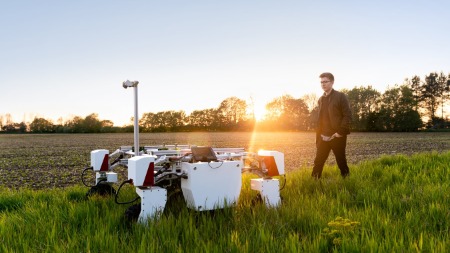News - March 8, 2021
International Women's Day: Reflecting on the Experiences of Women in Science Today


Written by SIF Expert Team 5 min read
To mark International Women’s Day, the Solar Impulse Foundation would like to dedicate a few words to honour the achievements and experiences of some of the amazing women who have supported us throughout our journey in labelling clean and profitable Solutions. This article has been written in collaboration with a number of Solar Impulse Experts, who have shared their views and experiences on being a woman in science and engineering today.
The origins of International Women's Day lie in the second international socialist women’s conference in 1910, when Clara Zetkin proposed that every year in every country there should be a celebration – a Women's Day – to press for equality. One year later, International Women's Day was honoured for the first time in Austria, Denmark, Germany and Switzerland. Since 1922, it has been celebrated on 8 March every year.
Today, International Women's Day is a global movement centred on the social, economic, cultural and political achievements and importance of all women. It is an opportunity to promote their visibility in society, as well as in business, education, research and more. This day is also a time for reflection and a call to action to accelerate gender equality and women empowerment.
According to Sustainable Development Goal 5, providing women and girls with equal access to education, health care, decent work, and representation in political and economic decision-making processes is crucial in creating sustainable economies and benefit society and humanity at large. This year, the United Nations is dedicating 8 March to the tremendous efforts by women and girls around the world in shaping a more equal future and recovery from the COVID-19 pandemic and highlights the gaps that remain (1).
Women in Science, Engineering and Sustainable Development
Women are leading ground-breaking research across the world. Despite the remarkable gains that women have made in education and the workforce over past decades, there is some way to go. Women still represent just about a third of researchers globally. The gender imbalance is particularly prevalent within science, with mathematics, physics, computer science and engineering all still having less than 20% female representation (2). These trends are reflected outside of academia too, with technology-driven fields typically being dominated by men (3). Within the Solar Impulse Expert Community, the situation is unfortunately still similar: Currently, out of around 365 Experts, only 85 are women.
The imbalance in the participation of women in Science, Technology, Engineering & Mathematics (STEM) is also often reflected in the seniority of positions, with fewer women still holding advanced positions. According to Ritalba Lamendola, Managing Director at EVEURA, “Even though there is a significant number of women working in science, they are most of the time doing lab work. It is important that they also have a seat at the decision tables”. This sentiment was echoed by Cristina Marolda, an expert on mobility and the environment: “there are in fact a lot of women in these sectors, but they are often reluctant to get into a strongly male dominated and frequently biased environment. They prefer to keep a ‘low profile’ to avoid a competition on a basis they don’t like.”
There is even evidence to suggest that this issue starts from a young age, with STEM being perceived as ‘masculine’ subjects by girls in secondary schools (4). With this in mind, it is no surprise that all too often STEM programmes at university still lack female representation:
“I was the only girl in a group of 60 boys in my undergraduate degree. Originally girls weren’t even allowed to take this course in mechanical engineering. I had to fight my way into the course by meeting with the vice-chancellor of the university. I am glad that they allowed me to study it, but it had its challenges, especially at such a young age.”Sarah Qureshi, CEO at Aero Engine Craft Pvt. Ltd
“Out of 150 people in my engineering degree, there were only 40 women. Since high school I have always been surrounded by men! I think things are changing, when I studied it was very different to even 10 or 20 years previous to that… we have not reached parity, but I think things are moving in the right direction, albeit slowly.”Sandra Hounkonnou, Group Environmental Footprint Coordinator at Fives Group
Beyond helping to change the world with their expertise, women are also role models for younger generations who want to pursue scientific careers. By watching women in science, young girls are encouraged to learn and be inspired by scientific subjects – starting form their teachers. At school, it is also extremely important to have a system which gives women the opportunity to believe in themselves. In fact, women empowerment is highly influenced by education, where most of us build our base. This is the environment in which we start to be given individual responsibilities and and also freedom.
“Early awareness among girls in engineering and science is important because they may think differently and may need more guarantees to pursue these careers, as they may not have had the role models to begin with.” Oona Freudenthal, Regulatory Science Engineer at LIST
“If women grow up with insecurity, they will have more doubts and lack of confidence. Not that I think questioning oneself is wrong, it can be really good sometimes, but not if it is only because she is a woman.”Floriane Petipas, Innovation Manager at Bouygues
Progress made, but more action needed
Things have come a long way in recent decades to improve conditions for women in science and sustainability. Reflecting on the beginning of her career, Cristina Marolda noted “I was in a very male-dominated unit. The idea of being a woman made everything I said not suasive. I always had to fight to get my vision across… That was very tough". We rightly celebrate that situations like this are much less common in 2021, but more must be done to make these science and sustainable development welcoming, accessible and attractive for women and girls.
To make these fields more attractive and open to women, changes are needed in how STEM subjects are perceived and communicated, as well as how wider, more systemic changes in workplaces to be more attractive to and catered towards women.
“I've always been used to being one of the few women in engineering but that's never been a problem for me. My advice would be don't care about that and don't be intimidated by it. It’s important to encourage young girls to dare, to be confident, to speak up”Sandra Hounkonnou
“Sometimes we dismiss our interests because they’re considered to be a man’s field. If it's something that is of specific interest to you, you should go for it. You don't have to be big or important or just one type of person to make a big difference. It doesn't matter if you are starting small, you have to start somewhere and you can make a difference. I think women should go for their passions, because something that is of interest to you is worth pursuing.Sarah Qureshi
It is important to ensure that women are not only participating in STEM fields, but are empowered to lead and innovate, bringing value to society. In order to do that, women need to be supported by workplace policies and organisational cultures, being treated with fairness and having their needs considered in areas where improvements are still needed (5). By looking to past generations, we can see that great progress has been made, but there is no doubt that more action is needed to ensure true equality between men and women and create a world where we can all be treated respectfully and fairly.
A big thank you to Sarah, Sandra, Cristina, Rouyu, Oona, Floriane and Ritalba for sharing their stories with us for International Women’s Day. To all our female Experts at Solar Impulse Foundation, thank you for your amazing work, and a Happy International Women's Day!
Interested in joining as an Expert? Get in touch with us or find out more here.

Written by SIF Expert Team on March 8, 2021


